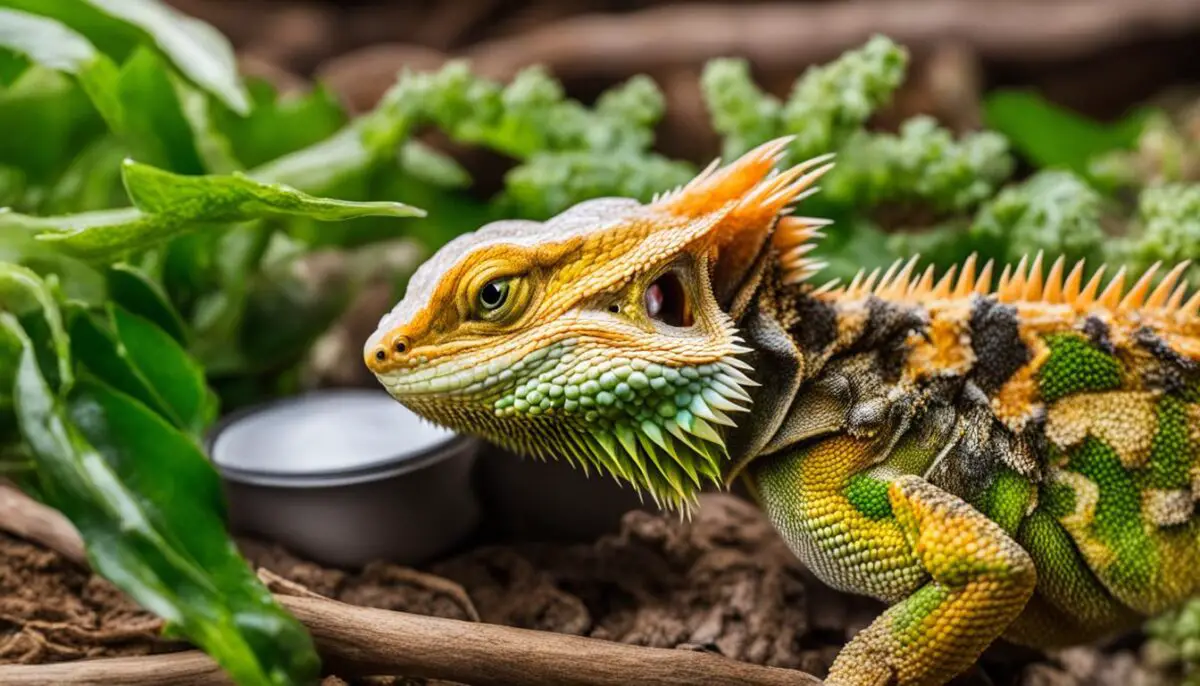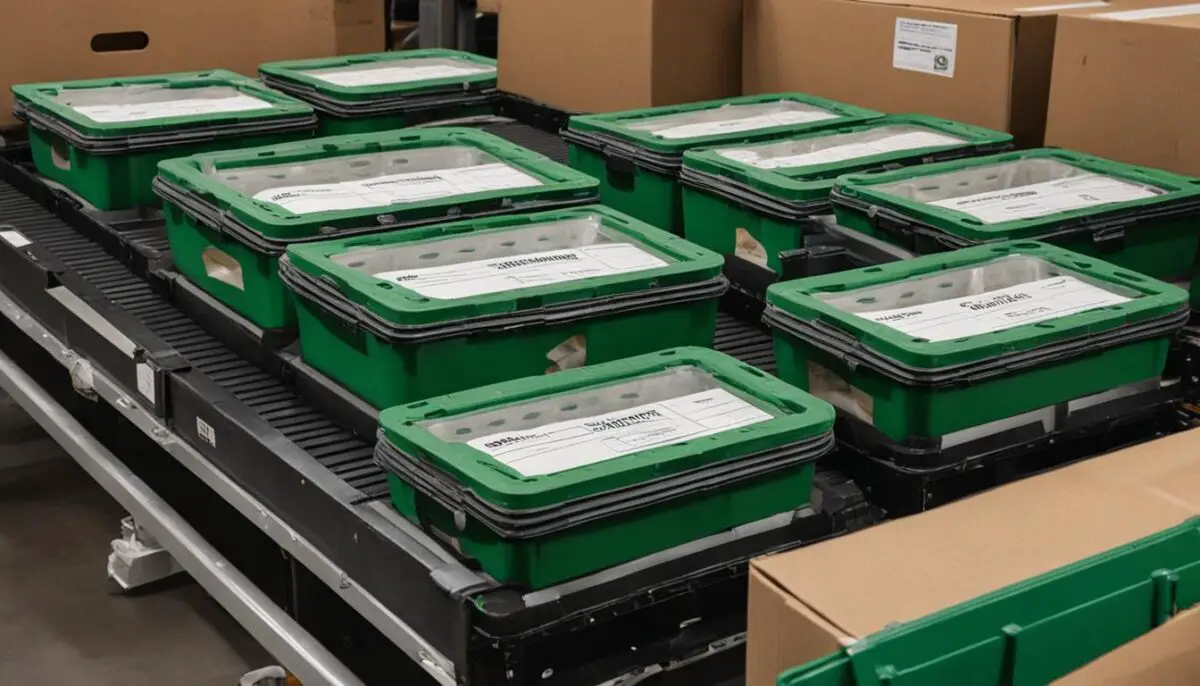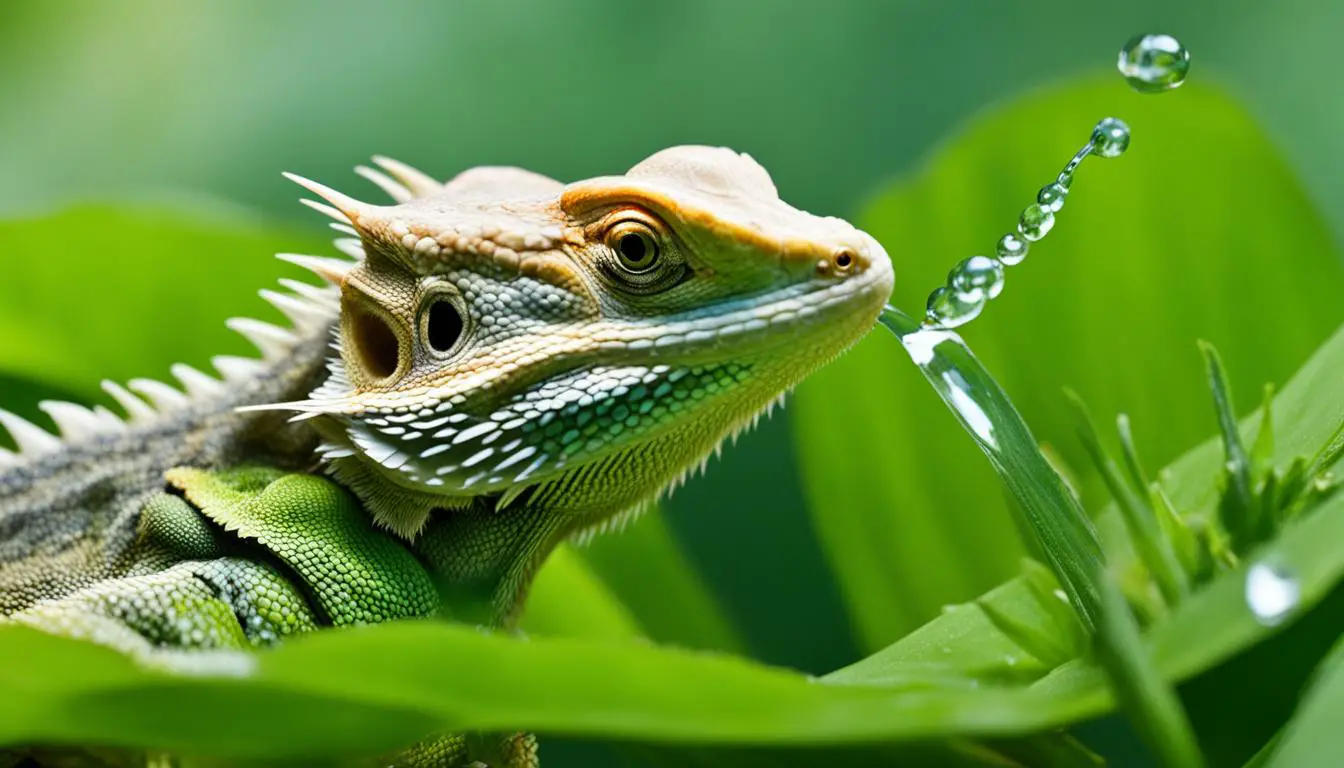Welcome to our article on hornworms and their suitability as a food source for bearded dragons. If you’re a bearded dragon owner looking for nutritious options to keep your reptile friend healthy and happy, you’ve come to the right place. We’ll explore the benefits of incorporating hornworms into a bearded dragon’s diet and provide insights on feeding, nutritional value, and more. Let’s dig in!
Key Takeaways:
- Hornworms are an excellent feeder for bearded dragons, offering vital nutrients for optimal health.
- They are high in calcium but low in fat, with a soft exoskeleton that is easy for bearded dragons to digest.
- Their vibrant green color can stimulate appetite, making them appealing to picky eaters.
- Feeding hornworms in moderation and incorporating a balanced diet is crucial for a bearded dragon’s overall well-being.
- Shipping and storing hornworms are relatively simple, making them a convenient option for pet owners.
Hornworms are nature’s little powerhouse of nutritional value for bearded dragons. They offer an excellent source of calcium for strong bones and muscles, high hydration content, easy digestibility, and the added benefit of appetite stimulation. However, it’s important to remember that hornworms should be fed in moderation and not be the sole source of nutrition for your bearded dragon.
| Nutrient | Amount per 100g of Hornworms |
|---|---|
| Calcium | 9.6mg |
| Fat | 2.9g |
| Protein | 7.7g |
| Water | 82g |
Table: Nutritional Composition of Hornworms per 100g
Feeding Hornworms to Bearded Dragons
When it comes to feeding hornworms to bearded dragons, moderation is key. While they can be offered as a treat, they should not be the primary component of a bearded dragon’s diet. It is important to provide a balanced nutritional plan that includes a variety of feeder insects and vegetables.
How often to feed hornworms to bearded dragons?
Bearded dragons should be fed hornworms no more than twice a week. This frequency ensures that hornworms remain a special addition to their diet and prevents overreliance on them as the sole source of nutrition.
Appropriate portion size of hornworms for bearded dragons
The portion size of the hornworms should be based on the size of the bearded dragon. For juvenile dragons, smaller hornworms are recommended to prevent any potential choking hazards. As the bearded dragon grows, larger hornworms can be offered as long as they are smaller than the gap between their eyes, ensuring safe consumption.
Hornworms should be fed in a designated feeding area to prevent any contamination from substrate or other potential hazards. This allows for easy monitoring and ensures that the bearded dragon can enjoy their meal in a clean and safe environment.
Remember, while hornworms are a nutritious treat, they should be supplemented with other feeder insects and a variety of vegetables to provide a well-rounded diet for bearded dragons.

Shipping and Storage of Hornworms
When it comes to shipping and storing hornworms, proper care is essential to ensure their health and vitality. Here are some important considerations to keep in mind:
Shipping Hornworms
Hornworms are typically shipped in cups with ample food to sustain their growth during transit. These cups come in various sizes, with larger cups providing enough food for the worms to reach their full adult size. It is important to handle the cups with care and avoid any rough handling that could cause damage to the hornworms.

Storing Hornworms
Once you receive the hornworms, it is important to store them properly to maintain their health and longevity. Follow these guidelines:
- Temperature requirements: Hornworms thrive in temperatures around 82°F, which promotes their maximum growth. However, they can be kept at lower temperatures, as low as 55°F, to slow down their growth. This can be beneficial if you want to extend their lifespan or delay their use as feeders.
- Refrigeration: If you want to maintain the size of the hornworms without allowing them to grow further, you can refrigerate them for up to two days at a temperature of around 45°F.
- Ventilation: Proper ventilation is crucial for the health of hornworms. Make sure the container you store them in has adequate airflow to prevent the buildup of moisture and potential mold growth.
- Waste removal: To maintain a clean and hygienic environment for the hornworms, it is important to remove waste from their container daily. This helps prevent bacterial or fungal growth that could harm the worms.
By following these care instructions for shipping and storing hornworms, you can ensure that they remain healthy and ready to provide optimal nutrition when it’s time to feed them to your bearded dragons.
Considerations When Feeding Hornworms to Bearded Dragons
Feeding hornworms to your bearded dragons requires careful consideration to ensure their safety and overall health. The size of the hornworms is a critical factor to bear in mind. If they are too large, they can become potential choking hazards for your bearded dragons. To prevent this, it is recommended to feed them hornworms that are smaller than the gap between their eyes. This ensures that the hornworms can be easily and safely consumed by your beloved reptile companions.
However, size considerations are not the only aspect to focus on when feeding hornworms. It is important to provide a variety of food options in your bearded dragon’s diet, including other feeder insects and vegetables. While hornworms offer valuable nutritional benefits, a well-rounded diet is vital for your bearded dragon’s overall well-being. By incorporating a diverse range of foods, you can ensure that your bearded dragon receives all the necessary nutrients to thrive.
Remember, bearded dragons are known for their diverse diets, enjoying a variety of insects, greens, fruits, and vegetables. This variety ensures a balanced diet that supports their growth, energy levels, and overall health. Be sure to consult with a reptile specialist or veterinarian to establish the ideal dietary plan for your specific bearded dragon.
Benefits of a Varied Diet for Bearded Dragons
A varied diet not only provides essential nutrients but also prevents nutritional deficiencies and promotes overall dietary satisfaction for bearded dragons. Just like humans, bearded dragons appreciate a diverse menu, and it can enhance their mealtime experience. Offering a wide range of food options not only caters to their preferences but also simulates their natural feeding habits in the wild.
Here are some crucial benefits to consider when incorporating variety into your bearded dragon’s diet:
- Optimal nutrition: Different foods offer different nutrients, and a varied diet ensures that your bearded dragon receives a balanced intake of essential vitamins, minerals, and macronutrients.
- Preventing boredom: Providing a variety of food options keeps mealtime interesting for your bearded dragon and reduces the risk of them becoming bored or disinterested in their food.
- Digestive health: A diverse diet promotes healthy digestion as different foods stimulate the digestive system in unique ways, preventing issues such as constipation.
- Enrichment and mental stimulation: The act of foraging and exploring different food textures and flavors provides mental enrichment for your bearded dragon, contributing to their overall well-being.
By offering a mix of feeder insects, such as hornworms, crickets, and dubia roaches, along with a variety of vegetables and fruits, you can create a well-rounded and enticing meal plan for your bearded dragon.
Hornworm Size Recommendation
As mentioned before, it is crucial to consider the size of the hornworms when feeding them to your bearded dragons. Feeding them hornworms that are too large can pose a choking hazard. To ensure the safety of your bearded dragon, it is recommended to follow the guideline of offering hornworms that are smaller than the gap between their eyes.
Use the following table as a reference for selecting the appropriate hornworm size based on your bearded dragon’s age:
| Age of Bearded Dragon | Recommended Hornworm Size |
|---|---|
| 0-3 months | 1/4 inch |
| 4-8 months | 1/2 inch |
| 9-12 months | 3/4 inch |
| 1+ year | 1 inch |
Note: The recommended hornworm sizes are general guidelines. Be sure to monitor your bearded dragon’s consumption and adjust portion sizes accordingly.
By carefully considering the size of the hornworms and incorporating a variety of food options into their diet, you can ensure the well-being and enjoyment of your beloved bearded dragons.
Conclusion
In conclusion, hornworms can be a beneficial addition to a bearded dragon’s diet as an occasional treat. They offer essential nutrients like calcium and hydration, while also enticing picky eaters with their bright green color. However, it is crucial to feed hornworms in moderation and not rely on them as the sole source of nutrition.
An optimal diet for bearded dragons consists of a balanced mixture of feeder insects and vegetables. This variety ensures that they receive all the necessary nutrients for their overall health and well-being. While hornworms can play a role in providing these nutrients, they should not be the primary component of a bearded dragon’s diet.
By offering a diverse and well-rounded diet, bearded dragons can thrive and maintain optimal health. So, while hornworms can be a healthy treat for these reptiles, it is important to prioritize a wide range of feeder insects and vegetables to provide a nutritionally balanced and varied diet for the entire lifespan of a bearded dragon.
FAQ
Are hornworms a healthy choice for bearded dragons?
Yes, hornworms are a healthy choice for bearded dragons. They provide essential nutrients and hydration.
What is the nutritional value of hornworms for bearded dragons?
Hornworms are high in calcium, low in fat, and have a soft exoskeleton that is easy to digest for bearded dragons.
How often should I feed hornworms to my bearded dragon?
It is recommended to feed bearded dragons no more than two hornworms per week as a treat.
What should be the portion size of hornworms for bearded dragons?
The portion size of hornworms should be appropriate for the size of the bearded dragon.
How should I store and ship hornworms?
Hornworms can be shipped in cups with sufficient food and should be kept at a temperature of around 82°F for maximum growth.
Are there any considerations when feeding hornworms to bearded dragons?
Yes, it is important to feed hornworms in moderation, consider the size of the hornworms, and provide variety in the bearded dragon’s diet.


